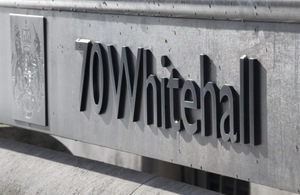- Pre-recorded cross-examination now available throughout England and Wales
- Reduces stress for vulnerable victims and witnesses who can give better evidence
- Pilot for victims of sexual and trafficking offences ongoing
New technology which spares vulnerable victims and witnesses the trauma of attending court is now available in every Crown Court across England and Wales.
Available immediately, it allows the likes of children or those who suffer from a debilitating condition to have their cross-examination video-recorded and played during the trial. The recording takes place as close to the time of the offence as possible in order to help memory recall and reduce the stress of giving evidence in a courtroom setting, which many find intimidating.
More than 350 victims and witnesses have benefited from the technology since regional rollouts began earlier this year.
The completion of national implementation comes as a similar process is being piloted for victims of sexual and modern slavery offences at Crown Courts in Liverpool, Leeds, and Kingston-Upon-Thames. Subject to an evaluation, the measure could be introduced at other courts.
Justice Minister, Alex Chalk MP, said:
The court process can be a harrowing experience for vulnerable victims and witnesses.
This technology seeks to minimise stress and ensure they can provide their best evidence, without reducing a defendant’s right to a fair trial.
This is part of our efforts to drive improvement for victims at every stage of the justice system.
Andrew Penhale, Chief Crown Prosecutor and CPS lead for Section 28 said:
The CPS is very conscious that being cross-examined at trial is particularly difficult for children and other vulnerable witnesses, many of whom have been exposed to very distressing and unpleasant crimes.
Waiting for the trial process can inevitably add to their anxiety so the fact this measure can significantly reduce the time they have to wait to give evidence will make a huge difference. In the current circumstances, we know reducing delay is more important than ever.
Dame Vera Baird QC, Victims’ Commissioner for England and Wales said:
I very much welcome this national roll-out, ensuring more vulnerable victims and witnesses have the option to pre-record their evidence. Giving evidence and being cross-examined in court can be a distressing and re-traumatising experience. This is especially true for a child or a vulnerable witness. This roll-out will enable more victims to put their experiences behind them sooner, rather than wait in anticipation for the trial which may be many months away.
I congratulate HMCTS and the Ministry of Justice in driving this forward and being so responsive. This has the potential to transform the criminal justice experience for so many vulnerable victims.
Anna Edmundson, NSPCC Head of Policy and Public Affairs said:
This is a welcome development from HMCTS and the Ministry of Justice. The NSPCC has campaigned for the introduction of pre-recorded cross-examination so that young people can give their evidence sooner rather than later and then start to look to the future and rebuild their lives.
Waiting for long periods to take part in court proceedings can be a traumatic experience for young witnesses so this national rollout is an important step towards protecting the best interests of children.
Alongside ensuring young victims and witnesses receive tailored support throughout the process, these changes should mean that children’s experiences of the criminal justice system are transformed.
Any decision to pre-record evidence is made by a judge on a case-by case basis.
The move is part of the government’s wider efforts to improve the support on offer at every stage of the justice system. These include a new Victims’ Code published last week which outlines the key information and level of service they should receive from the police, courts and other criminal justice agencies.
Meanwhile, more than £76m has been made available to support the most vulnerable during the pandemic – with a further £11m recently provided to help rape and domestic abuse services cope with a spike in demand expected this winter.
Since February 2020, more than 350 recordings have taken place across England and Wales.
Vulnerable witnesses and victims are defined as all child witnesses under 18 and any witness whose quality of evidence is likely to be diminished because they are suffering from a mental disorder or physical disability or has significant impairment of intelligence and social functioning.
Both the defence and prosecution lawyers will be present in court during the pre-recording as will the judge and the defendant.
Pre-recording cross-examination preserves a defendant’s right to a fair trial.
Feedback from the courts already operating the system shows that victims felt less stress and that witnesses were better able to recall events.
The full list of crown courts who have commenced pre-recording evidence sessions today are:
- Birmingham Crown Court
- Bournemouth Crown Court
- Cambridge Crown Court
- Coventry Crown Court
- Derby Crown Court
- Grimsby Crown Court
- Hereford Crown Court
- Hove Crown Court
- Isle of Wight Crown Court
- Kingston-Upon-Hull Crown Court
- Lincoln Crown Court
- Luton Crown Court
- Newcastle-upon-Tyne Crown Court
- Nottingham Crown Court
- Peterborough Crown Court
- Shrewsbury Crown Court
- Southend Crown Court
- Stoke-on-Trent Crown Court
- Taunton Crown Court
- Truro Crown Court
- Warwick Crown Court
Pre-recorded video evidence is already available at Crown Courts in Amersham, Aylesbury, Basildon, Bolton, Bradford, Bristol, Burnley, Canterbury, Caernarfon, Cardiff, Carlisle, Central Criminal Court, Chelmsford, Chester, Croydon, Doncaster, Durham, Exeter, Gloucester, Guildford, Harrow, Inner London, Ipswich, Isleworth, King’s Lynn, Kingston-upon-Thames, Lancaster, Leeds, Leicester, Lewes, Liverpool, Maidstone, Manchester Crown Square, Manchester Minshull Street, Merthyr Tydfil, Mold, Newport (Wales), Newcastle Moot Hall, Northampton, Norwich, Oxford, Plymouth, Preston, Portsmouth, Reading, Salisbury, Sheffield, Snaresbrook, Southwark, Southampton, Stafford, St Albans Swansea, Swindon, Teesside, Warrington, Winchester Wolverhampton, Wood Green, Woolwich, Worcester, York.

